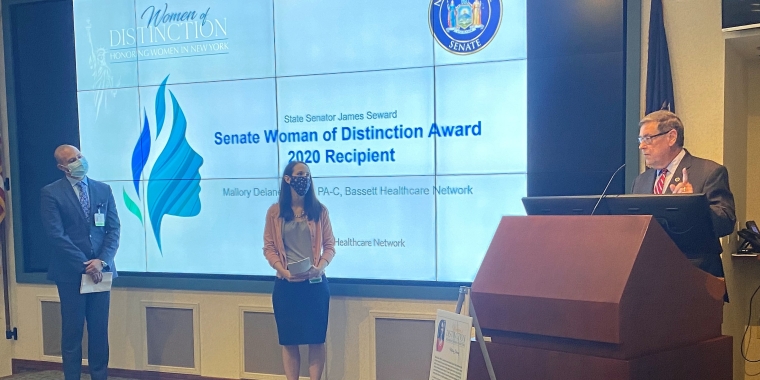
Start-Up NY Part Of The Solution
James L. Seward
June 18, 2013
ALBANY, 06/19/13 -- State Senator James L. Seward (R/C/I – Oneonta) today commented on the “Start-Up NY” economic development initiative:
“The Start-Up NY plan, which has been agreed to by the senate and assembly, is a positive modification of the governor’s Tax-Free NY proposal that I believe will assist with upstate job growth. Our SUNY campuses and community colleges remain the centerpiece of the economic development strategy which will make our region of the state a clear focal point for prospective new employers.
“The proposal also revamps the Excelsior Jobs Program in an effort to help existing businesses create jobs, particularly those in the all important manufacturing sector. There is also a new provision that will allow companies to call for a review of state mandates. These are significant additions that will help meet the needs of companies that have weathered challenging times that we’ve seen in recent years.
“In my view, Start-Up NY does not end the conversation on economic development, nor does it answer all of our job creation needs. It is another tool that can be used to further enhance what New York has to offer. Additional steps to reduce taxes for all businesses, lower utility costs, and cut unnecessary government red-tape are needed to truly improve our state’s economy and provide a foundation for long-term job growth.”
Details of the START-UP NY legislation include:
Tax-Free: Participating companies in START-UP NY will not pay any taxes (e.g. business/corporate taxes, sales taxes and property taxes) for 10 years. Employees in participating companies will pay no income taxes for the first five years. For the second five years, employees will pay no taxes on income up to $200,000 of wages for individuals, $250,000 for a head of household, and $300,000 for taxpayers filing a joint return. The number of net new jobs eligible for personal income tax benefits will not exceed 10,000 new jobs per year.
Business Eligibility: In order to locate into a START-UP NY tax-free community, a business will need to be aligned with or further the academic mission of the campus, college or university sponsoring the tax-free community. Businesses participating in the program will need to have positive community and economic benefits. Every business must create and maintain net new jobs in order to participate. Businesses must:
· Be a new start-up company;
· Be a company from out-of-state that is relocating to New York State; or
· Be the expansion of an existing New York State company – for example, a company creating a new line of business or opening a new advanced manufacturing facility – as long as it can demonstrate that it is creating new jobs and not moving existing jobs.
In addition, New York State start-ups that “hatch” from New York State incubators will be eligible to enter tax-free communities and be eligible for the benefits under the program.
A number of types of companies will be prohibited from participating, including retail and wholesale businesses and restaurants. In New York City and Nassau, Suffolk and Westchester counties, the business must also be a high-tech company or a new start-up company.
Companies will be eligible to enter into the program until December 31, 2020 and by that time Empire State Development (ESD)will prepare an evaluation of the effectiveness of the program in order to determine whether eligibility should be extended.
Each university community will develop a plan for the types of businesses it intends to attract and the locations that will be tax-free. Businesses will apply directly to the participating college and, once a business is accepted, ESD, will have 60 days to review the application to ensure eligibility.
Bans Competition with Existing Businesses: Under the START-UP NY program, businesses that would compete with other local businesses outside the tax-free area would be ineligible to participate.
Eligible Colleges and Universities: SUNY, CUNY and independent colleges and universities will all have the opportunity to develop tax-free communities.
SUNY: Every SUNY community college and 4-year college/university can establish a tax-free community using:
· Vacant land on the SUNY campus (for every campus outside of New York City);
· Vacant space in buildings on the SUNY campus (for every campus outside of NYC);
· Any business incubator with a bona fide affiliation to the campus, university or college; and
· Up to 200,000 square feet within one mile of a campus (for every campus north or west of Westchester County), or further with approval from ESD.
CUNY: CUNY will be able to establish a tax-free community on a campus in each borough – Manhattan, the Bronx, Queens, Brooklyn and Staten Island – in an area of economic distress. CUNY Tax-Free NY communities may include:
· Vacant land on the CUNY campus;
· Vacant space in buildings on the CUNY campus; and
· Any business incubator with a bona fide affiliation to the campus, university or college.
Private Colleges: The program also provides 3 million square feet (with the potential of another 600,000 more) of tax-free areas primarily dedicated to private colleges and universities on land north of Westchester County, to be allocated by the START-UP NY program board (consisting of three members with significant experience in academic-based entrepreneurship appointed by the Governor, the Speaker of the Assembly and the Temporary President of the Senate) in a manner that ensures regional balance and balance among eligible rural, urban and suburban areas in the State.
· For private colleges and universities north of Westchester County, the tax-free areas can include vacant land and vacant space on- or off-campus, as well as any business incubator with a bona fide affiliation to the campus, university or college.
· Of these 3 million square feet, 75,000 square feet will be allocated for each of the following: Nassau County, Suffolk County, Westchester County, Brooklyn, the Bronx, Manhattan, Queens and Staten Island. Private colleges and universities in New York City and Westchester, Suffolk and Nassau Counties, as well as SUNY and CUNY campuses not specifically designated, may apply to sponsor these tax-free areas on college campuses. Once the 75,000 square foot cap is reached in these counties and boroughs, the board may designate up to an additional 75,000 square feet in each. Therefore, a potential of 150,000 square feet of space will be available in these counties and boroughs.
20 Strategic State Properties: In addition, the 3-member board can also designate up to 20 strategic state assets as tax-free communities. These must be state-owned vacant land, state-owned vacant facilities or state-owned facilities that are in the process of closing and becoming vacant. Each will be affiliated with a SUNY, CUNY or independent college or university to attract new employers and new jobs and transform the site into a regional economic engine.
Robust Protections Against Fraud: START-UP NY includes strong provisions to protect against fraud. Businesses will have to submit certification to ESD, and falsifying certifications will be a felony. The legislation also includes strict provisions to guard against abuses such as shifting jobs among related entities or “shirtchanging,” when a company simply reincorporates under a new name and claims its existing employees are now new jobs. In addition, START-UP NY includes measures to prevent self-dealing and conflicts of interest. In cases of fraud, the State will be empowered to claw-back benefits granted to the business. Companies that do not meet the terms of the program – including meeting their job creation targets – may have their benefits reduced, suspended or terminated. ESD will have the authority to review company data to ensure that jobs have been created and maintained, and to end participation by companies that have not created net new jobs. ESD will be required to publish a comprehensive annual report to enable the public to evaluate the program’s impact.
Enhances the Excelsior Jobs Program. In 2011, the Excelsior Jobs program was reformed to provide flexibility to enhance the program. This program continues that effort by further enhancing the program to maximize job growth opportunities in the state.
Expanding the Mandate Relief Council to include Cost-drivers to Business. Under the program, the Mandate Relief Council is expanded to become the Mandate Relief and Regulatory Relief Council to allow businesses to request that the council reviews burdensome regulations on businesses.
Share this Article or Press Release
Newsroom
Go to NewsroomMohawk Valley Nine Pledge Support for Remington
September 28, 2020

Senator Seward Pays Tribute to Senate Woman of Distinction
September 8, 2020


